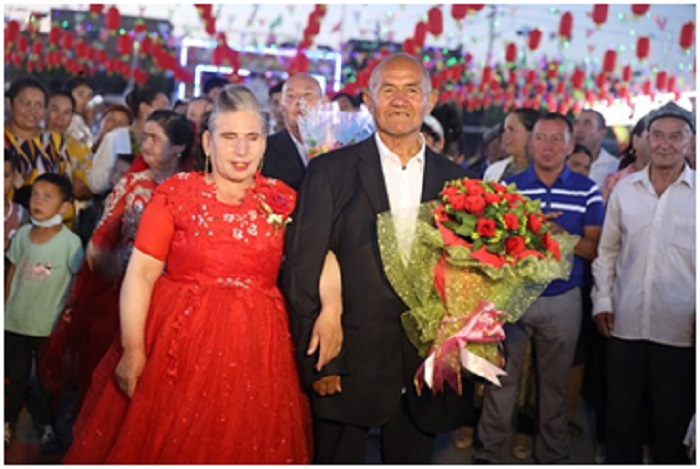



A total of 207 community-based elderly care facilities were built this year in 22 extremely impoverished counties in 4 prefectures in southern Xinjiang Uygur autonomous region. All of these facilities have been put into use by the end of June this year, housing all senior citizens that need care in these regions.
These facilities play an important role in alleviating the burdens of rural, especially impoverished households, and offer a great place for the seniors to enjoy their twilight years.
In a nursing home in Yuepuhu county, Kashgar, live 82 senior residents. Amat Dawut, 75, is one of them.
The senior’s son is working out-of-town, so his daughter-in-law has to manage all the farmland at home, as well as 2 cattle and 20 sheep. In addition, they had two school-age children. “When my daughter-in-law was busy farming, she barely had time to eat on time,” Amat said. To take care of him, his son had to always come back home, so the income was unstable.
Thanks to the new community-based elderly care facility, Amat’s problems are solved. The facility not only offers meals and medical services, but also has personnel that do laundry for the seniors. “My daughter-in-law now has enough time to take care of the family, and my son can also be at ease working outside,” Amat said, adding that his family income has increased a lot.
According to Jia Guowen, deputy director of the social assistance office for poverty alleviation under Xinjiang’s civil affairs department, the 207 elderly care facilities have all been equipped with principals and a total of 3,092 care givers. All of these staff have received relevant training. The civil affairs department also issued working guidance to regulate the operation and management of these elderly care facilities.
Every one of these facilities has a medical worker, and all seniors have their own health profiles. Medical worker Guzenur Abuliz told People’s Daily that the facility is able to treat common chronic diseases, and the facility is only 5 minutes of drive to the nearest health center. Guzenur said that once acute diseases happen, the seniors will soon be sent to the health center and superior hospitals. “Twenty-five seniors in our facility are now living in hospitals, and will come back after treatment,” Guzenur added.
These elderly care facilities not only offer a great nursing place, but also create jobs for local villagers. Azguri Abulahat was once a stay-at-home mom in Khayigula village, Yuepuhu county who had taken care of senior residents in her village. After receiving training courses, she came to work at a local community-based elderly care facility. “I have a shift every 24 hours, and earn 2,300 yuan ($348.68) per month,” she told People’s Daily, adding that the job also offers her social insurance. Her family’s livelihood was on a rise, she said.
Yutian county, home to a 667-hectare grape plantation base, has allocated the revenue of 133 hectares of the base to guarantee the operation of 4 of its elderly care facilities. Zhang Weiquan, head of the local civil affairs department, introduced that the sites of these facilities are all selected in favor of the seniors’ demands and near the residences of the seniors. The 133 hectares of the grape plantation base is now run by enterprises, and the planting, sales and profits are under the supervision of the civil affairs department, Zhang said.
So far, the wine grapes have been picked and generated a revenue of 3 million yuan. “The facilities are subsidized with 200 yuan for each senior per month. Counting in other subsidies and allowances, the monthly spending standards of each senior has reached 500 yuan,” Zhang said, adding that they are doing the best to ensure a happy life for the seniors.


The Executive and members of the.


The Acting Director, FCT Directorate of.


President Bola Ahmed Tinubu has been.



Barely a month after resignation of.


An Abuja based Legal Practitioner, Osuagwu.



Convener of Equitable Remedy, Mrs. Magaret.


Contractors handling the contract for city.


Nigerian government may have concluded plans.


The Diplomatic Correspondents Association of Nigeria.


A rights group, “Follow Me Talk.
Leave a Comment